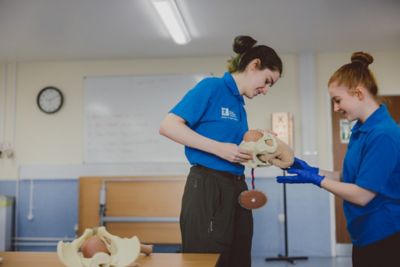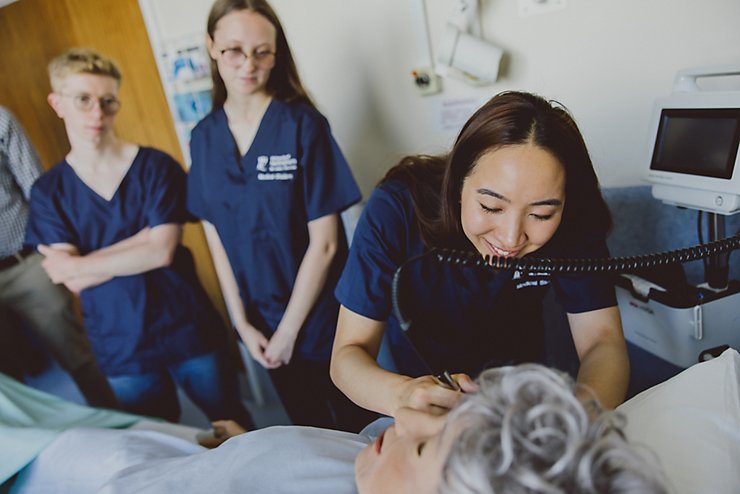Placements
Approximately 50% of the course is practice-based, giving you the opportunity to gain real-life clinical experience of midwifery care. By working closely with families in practice, you will support and educate them to prepare for and adapt to becoming parents.
Working alongside qualified midwives during your placements, you will develop key midwifery skills in practice across a variety of settings, including:
- the home environment
- community clinics
- antenatal, labour and postnatal wards
Our placements expand your experience of working across different sites at different trusts. This enables you to gain a wider perspective of the sector, understanding the challenges families and healthcare professionals face across the maternity services.
Our trust sites are:
- Nottingham University Hospitals (City Hospital and Queen's Medical Centre, Nottingham)*
- University Hospitals of Derby (Derby) and Burton (Staffordshire), NHS Foundation Trust*
- Chesterfield Royal Hospital (Chesterfield)*
- Sherwood Forest Hospitals (Mansfield)*
*While we try to ensure these placements are definitive, they may be subject to change from time-to-time.
Home and away placements
In your first year you will be allocated to one of our clinical placement sites, known as your 'home' base. In year two you will be allocated to a different trust, which is your 'away' base. You will return to your original 'home' clinical placement for your third year.
On accepting a place with us, you understand that you could be allocated to practice placements anywhere within the Midlands. The geographic spread of placements and the amount of travel required will vary.
During your third year you can undertake a two-week elective placement in the UK or overseas.
Please be aware that study abroad, compulsory year abroad, optional placements/internships and integrated year in industry opportunities may change at any time for a number of reasons, including curriculum developments, changes to arrangements with partner universities or placement/industry hosts, travel restrictions or other circumstances outside of the university’s control. Every effort will be made to update this information as quickly as possible should a change occur.
Placements
Approximately 50% of the course is practice-based, giving you the opportunity to gain real-life clinical experience of midwifery care. By working closely with families in practice, you will support and educate them to prepare for and adapt to becoming parents.
Working alongside qualified midwives during your placements, you will develop key midwifery skills in practice across a variety of settings, including:
- the home environment
- community clinics
- antenatal, labour and postnatal wards
Our placements expand your experience of working across different sites at different trusts. This enables you to gain a wider perspective of the sector, understanding the challenges families and healthcare professionals face across the maternity services.
Our trust sites are:
- Nottingham University Hospitals (City Hospital and Queen's Medical Centre, Nottingham)*
- University Hospitals of Derby (Derby) and Burton (Staffordshire), NHS Foundation Trust*
- Chesterfield Royal Hospital (Chesterfield)*
- Sherwood Forest Hospitals (Mansfield)*
*While we try to ensure these placements are definitive, they may be subject to change from time-to-time.
Home and away placements
In your first year, you'll complete your placements at one hospital trust, this is known as your 'away' base. In years two and three, you'll then move to a different trust, which is your 'home' base. This approach prepares you to be able to work anywhere in the UK.
On accepting a place with us, you understand that you could be allocated to practice placements anywhere within the Midlands. The geographic spread of placements and the amount of travel required will vary.
During your third year you can undertake a two-week elective placement in the UK or overseas.
Please be aware that study abroad, compulsory year abroad, optional placements/internships and integrated year in industry opportunities may change at any time for a number of reasons, including curriculum developments, changes to arrangements with partner universities or placement/industry hosts, travel restrictions or other circumstances outside of the university’s control. Every effort will be made to update this information as quickly as possible should a change occur.






